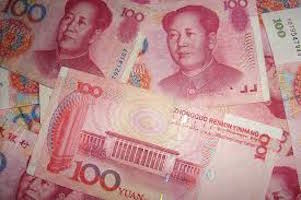At the end of World War II, virtually the entire world functioned on dollars. By some accounts, 100% of the world’s money supply was the dollar. Today that figure has dropped all the way down to 19%.
France Buys 65,000 Tons Of LNG From China In First Ever Yuan-Denominated Trade https://t.co/3kKNT19e5o
— zerohedge (@zerohedge) March 30, 2023
China’s economy has been immensely successful by most measures. Its gross domestic product (GDP) of $17.7 trillion is second only to the United States. It’s also the third-largest trading nation in the world — behind only the U.S. and E.U.
Over The Last 2 Weeks:
— The Kobeissi Letter (@KobeissiLetter) March 29, 2023
1. Saudi Arabia considers accepting Chinese Yuan for oil sales
2. China and France complete first LNG trade using Yuan
3. Russia considers using Chinese Yuan as reserve currency
4. Saudi Arabia partners with China to build refinery for 83.7 billion…
However, China’s currency — the renminbi , the yuan is a unit of the renminbi — only accounts for 3% of global trade. Compare that to the 87% market share of the U.S. dollar.
China and Brazil have reached a deal to trade in their own currencies, ditching the US dollar as an intermediary. pic.twitter.com/6cwpt2UPNR
— Trumps Nephew (@ForgiatoBlow47) March 29, 2023
The dominant reserve currency for global trade and cross-border commerce is determined by the perceived security and resilience of the issuing country. Central banks across the world prefer to hold this currency in reserve, resulting in its widespread use and label as the “reserve currency.” There have been six major reserve currency periods since 1450, with the U.S. dollar currently holding the top spot, accounting for over 75% of global transactions, 60% of foreign debt issuance, and 59% of global central bank reserves.
Although the dollar’s dominance has been gradually declining, there is no other currency that comes close to its level of use. However, recent geopolitical and macroeconomic trends indicate that the Chinese renminbi may rise to dominance in the future.
Xi and other Chinese leaders have expressed their desire to boost the renminbi’s profile as a reserve currency, and their economy and trade flows are large enough to support such a move.
To achieve this, China has collaborated with five nations–Indonesia, Malaysia, Hong Kong, Singapore, and Chile–and the Bank for International Settlements to create the Renminbi Liquidity Arrangement, with each nation contributing 15 billion yuan. These countries benefit from large discounts from China in exchange for their participation, and for buying goods from China which in turn boosts that economy. These deals enable China to avoid the dollar-based currency trading system. NuWire
As these partnerships strengthen, the yuan’s status as a reserve currency could become even more entrenched.
What does that mean for the USA?
Replacing the dollar isn’t going to be easy or quick. But countries are beginning to bypass the dollar. Largely because of the Russian sanctions, the yuan has already become a de facto reserve currency in Russia, with 17% of their foreign reserves denominated in yuan, and it is also the third most demanded currency on The Moscow Exchange.
Why are so many countries all of a sudden turning to the yuan to buy their essential commodities?
— Gonzalo Lira (@GonzaloLira1968) March 30, 2023
Why is the world de-dollarizing so quickly?
Simple — the Russian sanctions.
1/11
This growing influence could make the yuan an alternative to the U.S. dollar in a “multipolar” world. In other words, China might chip away at the dollar’s influence over time. The study’s authors said the renminbi’s current position was similar to the U.S. dollar in the 1950s. Based on that comment, it could be just a few decades before the yuan gains parity.
If the forecasts are correct, long-term investors should consider some exposure to yuan-denominated assets and Chinese stocks with significant yuan earnings.
From NuWire:
The list of potential implications is very long, and includes several scenarios that are almost apocalyptic. But most of the outcomes raise as many questions as they answer.
Let’s consider the Top Five:
- Global Gloom Leads to U.S. Doom: The U.S. dollar goes into freefall for the simple reason that if no country has to hold dollars any longer, they won’t. Instead – thanks to the ragged state of the U.S. government’s finances – many countries will dump greenbacks fast as they can, which will only put additional pressure on an already-strained U.S. financial system, which in turn will further damage our economy.
- Inflation Inflates: Inflation will strike here with a vengeance, as anything bought, sold or priced in dollars will instantly rise in price to offset this fall.
- Repatriation Risk: With the dollar serving as the world’s de facto currency, U.S. companies bear very little exchange rate risk when the time comes to repatriate assets or make currency-related adjustments. That would change overnight and prices throughout the value chains would rise sharply to compensate.
- Money Costs More: The cost of money itself would rise. If the dollar falls, not only will there be massive selling pressure against it, but the cost of borrowing it will rise dramatically as lenders raise rates to cope with the increased risk of dollar-based transactions.
- Death By Debt: And finally, if there is another reserve currency, other countries will no longer have to buy our debt, and you can guess where that will leave us – especially given the fact that we’ve taken on trillions in new debt to help finance our way out of our current mess.
Signs?
Over The Last 2 Weeks:
— The Kobeissi Letter (@KobeissiLetter) March 29, 2023
1. Saudi Arabia considers accepting Chinese Yuan for oil sales
2. China and France complete first LNG trade using Yuan
3. Russia considers using Chinese Yuan as reserve currency
4. Saudi Arabia partners with China to build refinery for 83.7 billion…

